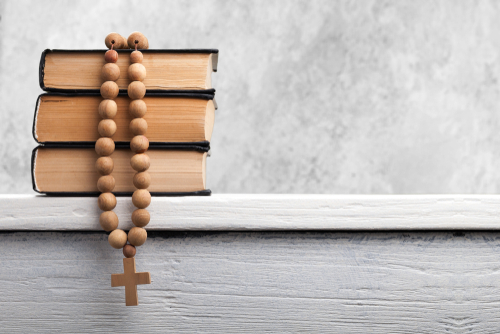How we celebrate and participate in Sunday Mass matters.
It takes organization and spirit to keep the liturgy growing and evolving for each of our ever-changing parish communities. In the early years following the Second Vatican Council and the Constitution on the Sacred Liturgy, it was assumed that the liturgy would be renewed by simply revising the texts and the manner of celebrating the rituals.
In more recent years, we have come to realize that we, the faithful, must be continually renewed in our participation, both internal and external, and that the liturgy itself is an on-going process of renewal and spiritual effort.
It is important that every parish maintain a process by which full, conscious and active participation of everyone involved becomes the continual goal, and that the cycle of liturgical seasons that give shape to our worship be attended to effectively.
In order to do this with joy and dedication, every parish needs a person or a team of people whose ministry it is to maintain this process and to prepare parish liturgy that is life-giving and beautiful. Liturgy coordination can be given over to competent lay people. The Archdiocesan Office for Worship can provide the training needed.
In the General Instruction of the Roman Missal (106) it states: “It is desirable, at least in cathedrals and in larger churches, to have some competent minister...to see to the appropriate arrangement of sacred actions and to their being carried out…with decorum, order and devotion.”
Our Los Angeles Archdiocesan pastoral letter on the liturgy: “Gather Faithfully Together: Guide for Sunday Mass from 1997 asks: “Where does responsibility for the liturgy rest? With the pastor, certainly, but who assists him? How effective and helpful are the relationships between principal people? If they need improving, how will this be done? If the parish has no one competent in the work of liturgy coordination, and no group or committee to support it, then finding a liturgy coordinator or committee must come first.”
In the Office for Worship's job description for a Parish Liturgy Director, it says: “The task of the director of liturgy requires a knowledge of the liturgy and a deep concern for all the ministers who make the celebration possible. While the pastor has the primary responsibility for the liturgical life of the parish, many others are also profoundly involved in the worship of the Church. The ability to instruct, organize and enable all those involved is the hallmark of a good liturgical director.”
A parish liturgy coordinator is like the glue that holds the liturgy together as a unified whole.
He must be effective at collaborating, coordinating and communicating. She is a major factor in establishing the spirit of hospitality and harmony in all liturgical celebrations. He must understand the nature of ritual worship and ritual music.
If you are a liturgy director or coordinator for your parish, remember, your job is not to introduce a new way of doing the liturgy, or to make it “better”, or to judge how liturgical ministers serve. Your role is to call forth the spirit of worship among all ministers and members of the assembly, and to let the innate prayerfulness of your parish community rise and find a home in ritual prayer.
Here is a checklist of items for a parish liturgy director/coordinator to keep in mind:
- rn
- Trust the ritual. Know the foundational principles of the ritual.
- Be a presence that reflects the communion we share in Christ.
- Work carefully at maintaining good relationships with all priests, liturgical ministers, musicians, and ordinary assembly members.
- Maintain thorough and constant communication with and among all liturgical ministers, priests and the assembly, as regards the liturgy.
- Help each liturgical ministry become a ministry, a group of people who serve and share a common goal. Encourage the ministers from various Mass times to meet together, socialize, build relationships.
- Provide weekly gatherings around the Word of God, particularly the lectionary readings for each upcoming Sunday.
- Work with your pastor to establish a parish liturgy committee. Ask the Office for Worship for assistance in this matter.
- In collaboration with the priests and liturgical ministers, establish ritual procedures for each liturgical ministry, put them in writing and post them in the sacristy.
- Practice Lectio Divina on your own and/or with other liturgical ministers.
- Learn silent prayer and contemplation in your personal life and encourage this in other liturgical ministers.
- Incorporate more silence at the appropriate times in the Mass
- Never stop reading and learning about the liturgy!
rn
rn
rn
rn
rn
rn
rn
rn
rn
rn
rn
rn
rn
Let’s all work together in our parishes, with our priests, to keep our liturgies life-giving, imbued with the power of God’s Word and the strength of communion in Christ.
Start your day with Always Forward, our award-winning e-newsletter. Get this smart, handpicked selection of the day’s top news, analysis and opinion, delivered to your inbox. Sign up absolutely free today!

